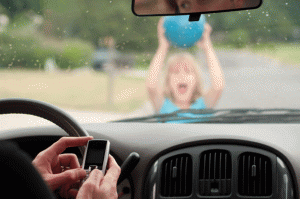Stay Safe This Holiday: No Texting and Driving
We’re attached at the hip to our smartphones and we use them just about everywhere. A restaurant owner in Boston, disheartened that his diners were staring at their phones and not each other during dinner, is now offering a free lunch to customers who’ll agree to turn in their phone at the door.
At the dinner table, staring at your phone is rude, but it doesn’t endanger anything but feelings. Refusing to ignore your phone when you’re driving can be deadly for you, your passengers and the other drivers on the road.

The average text takes five seconds to send. A driver going 55 miles an hour will travel the length of a football field in those five seconds.
The leading cause of death for teen drivers isn’t drinking; it’s texting. But don’t forget that teens aren’t the only ones texting. Adults also send texts (and emails!) while driving. All the faculties you need to drive safely (visual, manual and cognitive attention) are required to send a text.
A fatal accident can happen in the blink of an eye. The average text takes five seconds to send. A driver going 55 miles an hour will travel the length of a football field in those five seconds. That’s ample time and space for an accident to occur.
Forty-four states have banned texting for all drivers. Laws and fines vary from state to state. In California, a first offense may cost you $20. In Alaska, you might pay $10,000 and face a year of jail time. Here in Georgia, texting and driving is banned for all drivers and carries a maximum fine of $150. To learn more about national texting and driving laws, check out this interactive map from Distraction.gov.
Unfortunately, the laws banning texting and driving are difficult to enforce. Officers must prove beyond a reasonable doubt that the person they pull over wasn’t dialing a number or just talking on the phone. Drivers can easily quit mid-text to hide their phone when they see a police car, then go back to texting as soon as the police are out of sight.
In the two years after the ban went into effect, only 1,281 Georgia drivers were convicted of texting and driving. That’s incredibly low, considering how often people text and drive. Twenty-five percent of teens respond to at least one text every time they get behind the wheel. Twenty percent of teens and 10 percent of parents admit to having long, multi-text conversations while driving.
Of course, laws aren’t always the deterrent we hope they’ll be. A $150 fine may seem like a fair price for finishing your text. But the true cost of texting while driving lies in the lives of the people on the road. My partners and I represent people whose lives have changed irrevocably after a car accident. We know that the lives of people on the road are precious – a text can always, always wait.
My partners and I wish you a happy Thanksgiving. Please stay safe.

